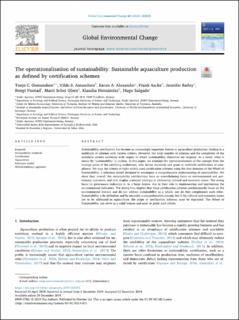| dc.contributor.author | Osmundsen, Tonje Cecilie | |
| dc.contributor.author | Amundsen, Vilde Steiro | |
| dc.contributor.author | Alexander, Karen A. | |
| dc.contributor.author | Asche, Frank | |
| dc.contributor.author | Bailey, Jennifer Leigh | |
| dc.contributor.author | Finstad, Bengt | |
| dc.contributor.author | Olsen, Marit Schei | |
| dc.contributor.author | Hernandez, Klaudia | |
| dc.contributor.author | Salgado, Hugo | |
| dc.date.accessioned | 2020-01-03T14:17:49Z | |
| dc.date.available | 2020-01-03T14:17:49Z | |
| dc.date.created | 2020-01-02T10:03:15Z | |
| dc.date.issued | 2020-01 | |
| dc.identifier.citation | Ommundsen, T.C., Amundsen, V.S., Alexander, K.A. et al. (2020) The operationalisation of sustainability: Sustainable aquaculture production as defined by certification schemes. Global Environmental Change, 60 | nb_NO |
| dc.identifier.issn | 0959-3780 | |
| dc.identifier.uri | http://hdl.handle.net/11250/2634855 | |
| dc.description.abstract | Sustainability certification has become an increasingly important feature in aquaculture production, leading to a multitude of schemes with various criteria. However, the large number of schemes and the complexity of the standards creates confusion with respect to which sustainability objectives are targeted. As a result, what is meant by ‘sustainability’ is unclear. In this paper, we examine the operationalisation of the concept from the vantage point of the certifying authorities, who devise standards and grant or withhold certification of compliance. We map the criteria of eight widely-used certification schemes using the four domains of the Wheel of Sustainability, a reference model designed to encompass a comprehensive understanding of sustainability. We show that, overall, the sustainability certifications have an overwhelming focus on environmental and governance indicators, and only display scattered attempts at addressing cultural and economic issues. The strong focus on governance indicators is, to a large degree, due to their role in implementing and legitimising the environmental indicators. The strong bias implies that these certification schemes predominantly focus on the environmental domain and do not address sustainability as a whole, nor do they complement each other. Sustainability is by definition and by necessity a comprehensive concept, but if the cultural and economic issues are to be addressed in aquaculture, the scope of certification schemes must be expanded. The Wheel of Sustainability can serve as a valid lexicon and asset to guide such efforts. | nb_NO |
| dc.language.iso | eng | nb_NO |
| dc.publisher | Elsevier B.V. | nb_NO |
| dc.rights | Attribution-NonCommercial-NoDerivatives 4.0 Internasjonal | * |
| dc.rights.uri | http://creativecommons.org/licenses/by-nc-nd/4.0/deed.no | * |
| dc.subject | akvakultur | nb_NO |
| dc.subject | bærekraft | nb_NO |
| dc.subject | sertifisering | nb_NO |
| dc.title | The operationalisation of sustainability: Sustainable aquaculture production as defined by certification schemes | nb_NO |
| dc.type | Journal article | nb_NO |
| dc.type | Peer reviewed | nb_NO |
| dc.description.version | publishedVersion | nb_NO |
| dc.subject.nsi | VDP::Agriculture and fishery disciplines: 900::Fisheries science: 920::Aquaculture: 922 | nb_NO |
| dc.source.volume | 60 | nb_NO |
| dc.source.journal | Global Environmental Change | nb_NO |
| dc.identifier.doi | 10.1016/j.gloenvcha.2019.102025 | |
| dc.identifier.cristin | 1764935 | |
| cristin.unitcode | 217,8,3,0 | |
| cristin.unitname | Institutt for sikkerhet, økonomi og planlegging | |
| cristin.ispublished | true | |
| cristin.qualitycode | 2 | |

